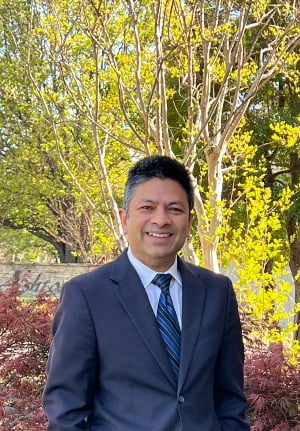
Northern Kentucky University (NKU) faculty member Dr. Rupesh Agrawal isn’t wasting his chance to make positive changes.
“I didn’t want to just teach — I wanted to make an impact,” he said. “With my position at the university, my research and corporate background, it has given me an amalgamation of opportunities to make an impact on the careers of students.
“Academia is the only profession where you get promoted based on service to the university, community, society at large — local, national and international. This motivated me to serve.”
That motivation also led Dr. Agrawal to his hometown of Gonda, Uttar Pradesh, India, to conduct a sleep disorder project in June 2022 that also included community awareness efforts.
“I had leverage and an understanding of the local culture,” he said. “I am usually motivated toward serving smaller towns and smaller businesses. Most of the research doesn’t start in smaller cities, but I create more impact if I start from a smaller city than a bigger city.”
Dr. Agrawal, who suffers from sleep apnea, has plenty of experience in the subject matter of the outreach program since he developed sleep apnea several years ago.
“I was diagnosed when I was working a student,” he said. “I found out I had sleep apnea because I am working on a project to commercialize a wearable garment for a home sleep test.”
“Because of that, I could work on something interesting to me because it improved my health. I have been studying sleep ever since, including at Oklahoma State University for 10 years.”
Rested and Ready
Dr. Agrawal said the outreach program, in collaboration with Great Plains Avadh Sleep Specialists (GPSS) in Oklahoma, was more community-oriented than his normal research projects.
“This one is more to help the population directly,” he said. “Most of the time, it helps in some form or fashion… but I saw an immediate impact.
“I also wrote a small article that was published in the newspaper. I did interviews with the local newspapers. In the outreach program, we talked to small groups about sleep and health and the benefits of diagnostics and treatment. We hosted a couple of seminars for the local medical community to educate them about the research and…improve the impact of outreach.”
Part of the program’s impetus was to help kick-start a Sleep Institute in Dr. Agrawal’s hometown to broaden the impact of the research and diagnostics.
“We are working on setting up a sleep institute in collaboration with a local hospital and an orthopedic surgeon, Dr. N N Tiwari,” he said. “Our goal is to start the center there, then expand it. Our current collaborator, GPSS, funds my sleep research at NKU.”
Back in Kentucky, Dr. Agrawal teaches in NKU’s online Master of Science in Health Informatics (MHI) program, where he was recently appointed director.
“One of the things on my wish list is for the program to be more international,” he said. “We talk about providing international exposure, so I am trying to give our students at NKU that exposure.
“I want collaboration where our students can go to India, learn and see how things are different and how it can be done in other parts of the world.”
Dr. Agrawal said his goal also includes helping international students come to NKU from India to see how research applies in the United States.
“I want to identify these university students who could come to NKU for the Health Informatics program,” he said. “There is not much research happening in India in the sleep apnea field.
“I want to provide more opportunities to people in my home country. Then, it will probably be more appreciated. They are interested but don’t know how to go about it.”
Results Driven
Dr. Agrawal enjoyed the experience of applying his research and knowledge in his hometown, where he started his professional career.
He graduated with a master’s degree in engineering and business (2012) and a Doctor of Philosophy in Management Science and Information Systems (2020) from Oklahoma State University. His first teaching job was during his undergrad at Wichita State University.
“I had some inkling in the past about teaching,” he said. “I wanted to start a school for girls in India. My father helped start a high school in 2016…Something was there in the back of my mind with the research and all of these things that I had done.”
With that diverse background and experience, Dr. Agrawal believes he has the tools to continue to help the general population lead better lives through research.
“My whole family background is business,” he said. “Community-based research helps the masses more immediately than only publishing a paper. I am driven by how I can do the research and get it into the hands of the public.”
The experience of the outreach program also shows one of the many different career outcomes that graduates of the MIH program can pursue. Dr. Agrawal said it also translates to other areas.
“If somebody wants to go to another part of the country to start an outreach program, the project is a model for launching a business in a new market,” he said.
“We made flyers that we distributed and published in newspapers. We created a Facebook page, so the community knew what was happening. We raised a little bit of a stir in the market.”
As Dr. Agrawal continues his role at NKU, he looks forward to more outreach programs and research programs around the world and at home in the U.S.
“This program proves that a researcher…can make a difference in communities based on research,” he said. “It also touches students, research, academics, industry and the general population.
“Larger universities can do things with tons of money and grants, but we are able to do it with less than $10,000. That’s pretty exciting.”
Dr. Agrawal has an upcoming podcast, Taste of Informatics, about his experience with the project.
Learn more about NKU’s online M.S. in Health Informatics program.